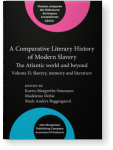Chapter 12
The confluence of fiction, historical memory and oral history
The crises of identity and traumatic memories in Ama: A Story of the Atlantic Slave
Trade
The slave trade enterprise in Africa and its memory continue to remain one of the emotive subjects
within the collective consciousness of people across time and space. This chapter revisits the belated trauma of the
Atlantic slave trade in Manu Herbstein’s neo-slave narrative, Ama: A Story of the Atlantic Slave Trade. Drawing on the
intersection between fiction, historical memory, and oral history, the chapter explores the crises of identity and the
trauma of both individual and communal dislocation. The chapter argues that Manu Herbstein’s text complicates our
understanding of not only the tragedy of enslavement but also of the complexities of an internal diaspora resulting
from the dislocation of a people. The chapter also pays critical attention to the alienation created through the
renaming of enslaved people, language barriers, and the dissolution of families.
Article outline
- Introduction
- Where oral history and historical memory intersect fiction
- “Graves without bodies”: Violence and Death in the Collective Memory of Surviving Kinsfolk
- “Living Hearts of Unspoken fear”: On the nature and absence of belonging
- Framing the absence of identity of the enslaved: Names and naming
- Fragmented identities: Language and identity construction
- Conclusion
- Author queries
-
References
This content is being prepared for publication; it may be subject to changes.
